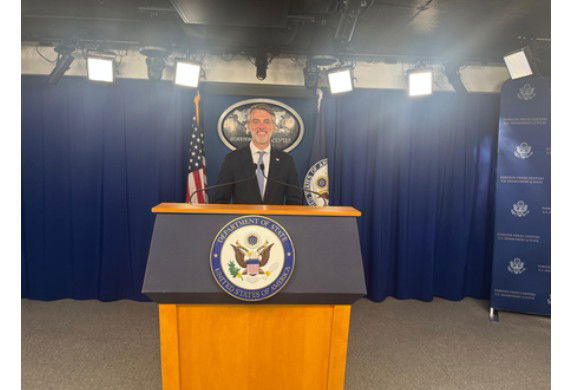America
US continues to work with Quad partners, says State Department official

Washington, Nov 7
A senior State Department official told IANS that the Trump administration remains committed to working closely with its Quad partners and such cooperation will continue in the future.
While responding to a question from IANS at the State Department, Casey Mace, US Senior Official to the Asia-Pacific Economic Forum (APEC), on Thursday, termed the collaboration among the Quad partners as “fruitful.”
“I can say and confirm that we continue to work with our Quad partners. It's been a really, very fruitful configuration for us to cooperate with these close partners of ours, and that work continues,” Mace told IANS.
At the same time, he refused to confirm the dates of the Quad Leaders’ Summit in India, saying he did not have “anything to announce” yet.
The Quad is an informal strategic partnership among four democracies — India, the United States, Japan, and Australia — committed to promoting a free and open Indo-Pacific.
His statement comes on a day when US President Donald Trump said he plans to visit India soon, praising Prime Minister Narendra Modi as a “great man” and his “friend.”
“He's a friend of mine, and we speak, and he wants me to go there. We'll figure that out. I'll go…He’s a great man and I’ll be going,” he told reporters at the White House on Thursday.
Mace also attempted to reassure US allies and friends in Asia over Washington's Indo-Pacific strategy.
Some experts have raised questions over the US commitment to the region after President Donald Trump and Secretary of War Pete Hegseth recently characterised US ties with China under a “G2” framework.
Trump, on October 30, wrote on Truth Social, “The G2 WILL BE CONVENING SHORTLY!” hours before he met Chinese President Xi Jinping in South Korea.
However, Mace argued that labelling is a “distraction” and does not reflect the reality of US engagements.
“United States values its partnerships with all of our partners and allies in the Asia-Pacific region, and I think labels can be a distraction.
What's important is the amount of the amount of energy and investment we're pouring into our partnership and alliances should speak to how important we see them. So I would say that it's important to look at all of what the United States is doing with the region, with our partners and allies, and draw conclusions from that,” he told IANS.
-



































